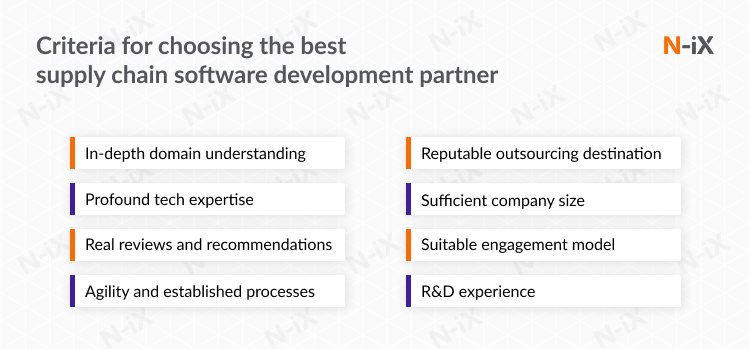CNBC reports that companies worldwide are struggling with the disruption of their supply chains, and the situation is only getting worse [1]. For example, GAP reports more than $300M losses due to the changes in their manufacturing, supply, and shipment schedules caused by the second wave of the pandemic [2]. So how can your business survive this crisis and emerge even stronger? How can you build or upgrade your supply chain to the best of your ability? How can you digitize your processes, scale up your operations, and gain a better understanding of all affairs? It is easier done with a reliable tech partner by your side.
In this article, we will talk about the process of finding the best logistics and supply chain software development company.
Contents
- Step 1: Define your business needs
- Step 2: Narrow down the selection criteria
- Step 3: Create a long list of vendors
- Step 4: Shortlist the pool of potential partners
- What to look for, if you need to:
Step 1: Define your business needs
There are certain things that no software can fix. Force majeure situations, lack of personnel, or world-wide disruptions – all these things cannot be fixed on the technical level. However, you might be struggling with transparency of your supply chain, predictability, inefficient performance, or ultimate dependency on human resources. In this case, changing your software or adding new features to it can definitely help. The more you understand your problem and have a clear vision of what the desired outcome should be, the easier it will be to find a reliable vendor and come up with the optimal solution.
Step 2: Narrow down the selection criteria
Next, you need to establish the eligibility criteria for the vendor selection process. These can be:
- Understanding of your domain;
- Experience working with similar companies;
- References and reviews from clients;
- Or any other significant aspects.
In the visual below, you can see our take on the selection criteria for finding a proper vendor.

Step 3: Create a long list of vendors
Clutch lists a little under 1,400 companies with supply chain, logistics, and transportation expertise. The lion’s share of these companies is from the established outsourcing destinations, such are Eastern Europe, Asia, and South America.

When you are creating a long list of potential vendors, here’s what you need to keep in mind:
- Choose an established outsourcing destination. Look for the country with a decent number of vendors, sufficient tech talent pool, and excellent reputation.
- Focus on vendors that have at least 250+ experts. Smaller vendors might not be able to scale up quickly or find a large team to work on your project.
- Include companies with 5+ years of market presence. They are more likely to have more experience in developing complex solutions for their clients.
- Use dedicated directories like Clutch to compile the list of vendors and check their reviews. Such websites go to a great length to verify the reviews, conduct interviews, and publish only real reviews with no sugarcoating.
Step 4: Shortlist the pool of potential partners
Once you have a long list of companies, it’s time to take a closer look at them and narrow down this list. This brings us to your business needs. When searching for a supply chain or logistics software development company, it's crucial to look for a vendor with a portfolio of projects in your domain and technical expertise needed to carry them out. Let’s take a look at some of the most common challenges that many businesses face and what digital supply chain trends that can help tackle them.
What to look for, if you need to…
…optimize or modernize an existing platform
Sometimes companies already have digital systems in place, but unfortunately, those platforms don’t live up to the clients’ expectations. In this case, the client needs to breathe some life into their supply chain.
If this is your case, look for a company that has expertise in:
- Cloud. Most modern platforms run in the cloud, so in order to succeed, you will need a partner that has experience with cloud adoption, migration, and optimization.
- Microservices. While migrating to the cloud, it’s a common practice to switch to microservices architecture, as it allows optimizing the performance and adding new features with less effort.
- DevOps. It will help you optimize the costs of your infrastructure, as well as implement proper pipelines for CI/CD. Moreover, strong DevOps expertise means that your tech partner will be able to help you with site reliability engineering, recovery plans, and overall security of your system.
…understand what happens within your supply chain and why
Companies collect tons of data. However, only half of it is processed, stored, and used properly to bring value to business. Modern digital supply chains rely heavily on complex data analytics solutions to understand the processes, make predictions and well-informed decisions.

If you need help with taming your data and getting the most out of it, search for a tech partner with strong portfolio of:
- Data analytics. It will help you increase the transparency of the processes within the supply chain, understand the success and failure of specific areas, and improve the decision-making process.
- Big data. This type of data allows unveiling hidden patterns, discovering correlations that are now visible to the humans, and predicting market changes.
- Business intelligence. It helps companies to aggregate multiple data sources, cleanse and prepare the data for analysis; provide reporting and analytics for different departments and stakeholders in the company.
Keep reading: How to mitigate supply chain risks with Data Analytics.
…reduce human involvement
One of the key aspects of Industry 4.0 is advanced automation with a focus on reduced human involvement. The global pandemic has reinforced this tendency. If you are struggling with high dependability of all your processes on your workforce, it might be the time to introduce:
- AI & ML algorithms. Machine learning is a huge trend in the industry. It allows businesses to reduce manual work, make predictions, detect anomalies, optimize processes, and introduce new technological solutions.
- Computer vision. CV solutions improve areas that workers might be struggling with, for example, tracking of goods, defect reduction, package inspection, scanning and labeling of items, and many others.
- Robotic process automation. We are talking about automated guided vehicles (AGV), automated mobile robots (AMR), or any other robotic solutions aimed at automation of supply chain segments [3].

You may be interested in:
- Machine learning in supply chain: 8 use cases that will impress you
- Computer Vision and Industry 4.0: How to make the most of it
- Industrial automation: Everything you need to know
…connect different subsystems
As the supply chain becomes more digital, many companies face the need of a single platform that connects all links of the chain and provides convenient supply digital management [4,5]. If you have found yourself in the desperate need of such a system, you will have to find a tech partner with experience in:
- Digital platforms. While there are many platforms for order and enterprise management (like Salesforce, SAP, Open Text, etc), there are even more solutions for the logistics, last mile delivery, and other vital parts of your digital supply chain.
- Security and performance optimization. While connecting different systems into a single platform is just the first part of the process, your vendor will have to optimize the overall performance of the system and ensure it complies with the best standards of the industry.
- Infrastructure and application support. Moreover, your potential tech partner should be able to set up and scale the optimal infrastructure that serves the needs of your business.
…digitize your supply chain
Digital transformation of the supply chain is a huge trend right now, as companies need to automate and optimize the processes, reduce human involvement, predict what is going to happen and, overall, find a solution to a technical challenge.
Opt for a company that has an end-to-end expertise in complex supply chain implementation. Your vendor should have strong expertise in business analysis, software architecture, and preferably all the things we have discussed before. However, don’t forget to ask them about:
- Discovery phase. If you plan to test your idea or need help verifying the requirements, it’s best to take care of it during a discovery phase to prove the feasibility and have a clear vision of an end product.
- End-to-end development. Will your vendor be able to handle every single part of the project? Do they have enough resources and expertise to do that?
- Post-production maintenance and support. How long will you get their support after the production of your software?
Wrap up
Overall, while you are looking for the best logistics and supply chain software development company, opt for a vendor with a strong technical expertise, end-to-end development services, and in-depth understanding of the domain. This will help you find the tech partner for a successful cooperation, and, as a result, will help you accelerate your supply chain management.
Why choose N-iX as your supply chain and logistics software development company?
- Since 2002, we have partnered with Fortune 500 companies, tech giants, and global enterprises to help them optimize and digitize their supply chain management.
- We have strong technical expertise in custom software development, digital transformation, compex data analytics solutions, and other areas.
- Robust cloud expertise. The company is a certified AWS Select Consulting Partner, a Microsoft gold certified partner, as well as a Google Cloud Platform Partner;
- N-iX is compliant with all the required Infosecurity regulations, including PCI DSS, ISO 9001, ISO 27001, and GDPR.
References:
- Supply chain chaos is already hitting global growth. And it’s about to get worse by SNBC
- GAP lost $300 million in sales because of supply chain mess by CNN Business
- Autonomous Robots and the Future of Supply Chain by Deloitte US
- The Rise of Supply Chain Platforms by Kearney.com
- Supply Chain 4.0 – the next-generation digital supply chain by McKinsey




